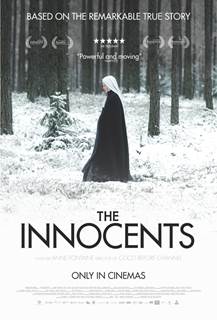The Innocents Dir: Eskil Vogt (Film Review)
The Innocents (De Uskyldige) is a serene and spooky supernatural film by director, Eskil Vogt, that examines the loss of childhood innocence through a surprisingly grounded portrayal of Norwegian children developing superpowers.
Starring: Rakel Lenora Fløttum, Alva Brynsmo Ramstad, Sam Ashraf, Mina Yasmin, Bremseth Asheim, Ellen Dorrit Petersen, Morten Svartveit, Kadra Yusuf, Lisa Tønne
 The Innocents is a strange and beautiful Scandi film in all the best ways. Surreal Norwegian landscape? Check. High contrast between forests and beige-palette buildings? Check. Children that terrify you with their presence by simply existing? Check.
The Innocents is a strange and beautiful Scandi film in all the best ways. Surreal Norwegian landscape? Check. High contrast between forests and beige-palette buildings? Check. Children that terrify you with their presence by simply existing? Check.
The film’s story is difficult to encapsulate in a paragraph, largely because it feels secondary to the emotional thread that drives the film’s narrative. The Innocents distinguishes itself from a standard drama by introducing the superpower element, but relies heavily on its dramatic core to draw you into its surreal story about the golden years of childhood innocence, before an increasing awareness of the world and social structures and personal responsibilities begin to influence your decisions and, as a result, who you become.
Cold, calculated, future-super-villain and tiny child, Ida (Rakel Lenora Fløttum) moves to a new area with her family, which include two mostly oblivious parents and her victim-of-punishment and deeply autistic older sister Anna (Alva Brynsmo Ramstad). Ida soon runs out of either curiosity or just ways to torture her sister and, with the majority of other children on holidays, she begins spending time with social outcast Ben (Sam Ashraf), who almost immediately reveals his emerging telekinetic powers.
While Ida is distracted by Ben’s ability to move a bottle cap, Anna begins a psychic connection with empath Aisha (Mina Yasmin Bremseth Asheim) which soon leads to the two children meeting and becoming inseparable. The four children begin spending time as a group, evoking a glimpse of a supernatural Lord of The Flies and serving as an authentic catalyst for the film’s second half and closing scenes.
The Innocents is a beautiful film to look at, with director Eskil Vogt drawing the most out of its contrasting landscapes and the visual aesthetic of its characters. There’s a clinical, neutral-prison feel in much of the film’s surroundings, and this is reflected brilliantly in Ida’s curiously detached journey through the film.
Its cast is exceptional, both individually and as a group, and needs to be for everything here to work as well as it does. The film’s lead group of children all carry the emotional weight of the film brilliantly, with each of their characters balancing the consequence-free innocence of childhood with the perceptive awareness of power and responsibility that few adults even learn to fully master and control.
The Innocents is a gracious film for its genre in that it asks little from the audience to enjoy or suspend disbelief for its runtime. There’s little required for any audience to enjoy the majority of what the film offers as art and entertainment, yet never limits or confines itself from allowing the audience to ask deeper and more thought-provoking questions about innocence, justice, community, power, and the complex journey toward understanding what it means to be a good human, and whether any of us truly have the capacity to be one.
Oxford Lamoureaux
- The Dead South – Powerstation: April 5, 2024 (Concert Review) - April 6, 2024
- Queens of The Stone Age – Spark Arena: February 29, 2024 (Concert Review) - March 1, 2024
- Dune: Part Two – Dir: Denis Villeneuve (Film Review) - February 29, 2024
